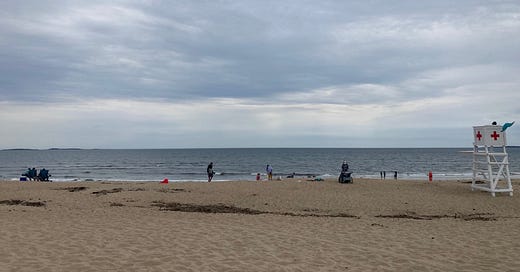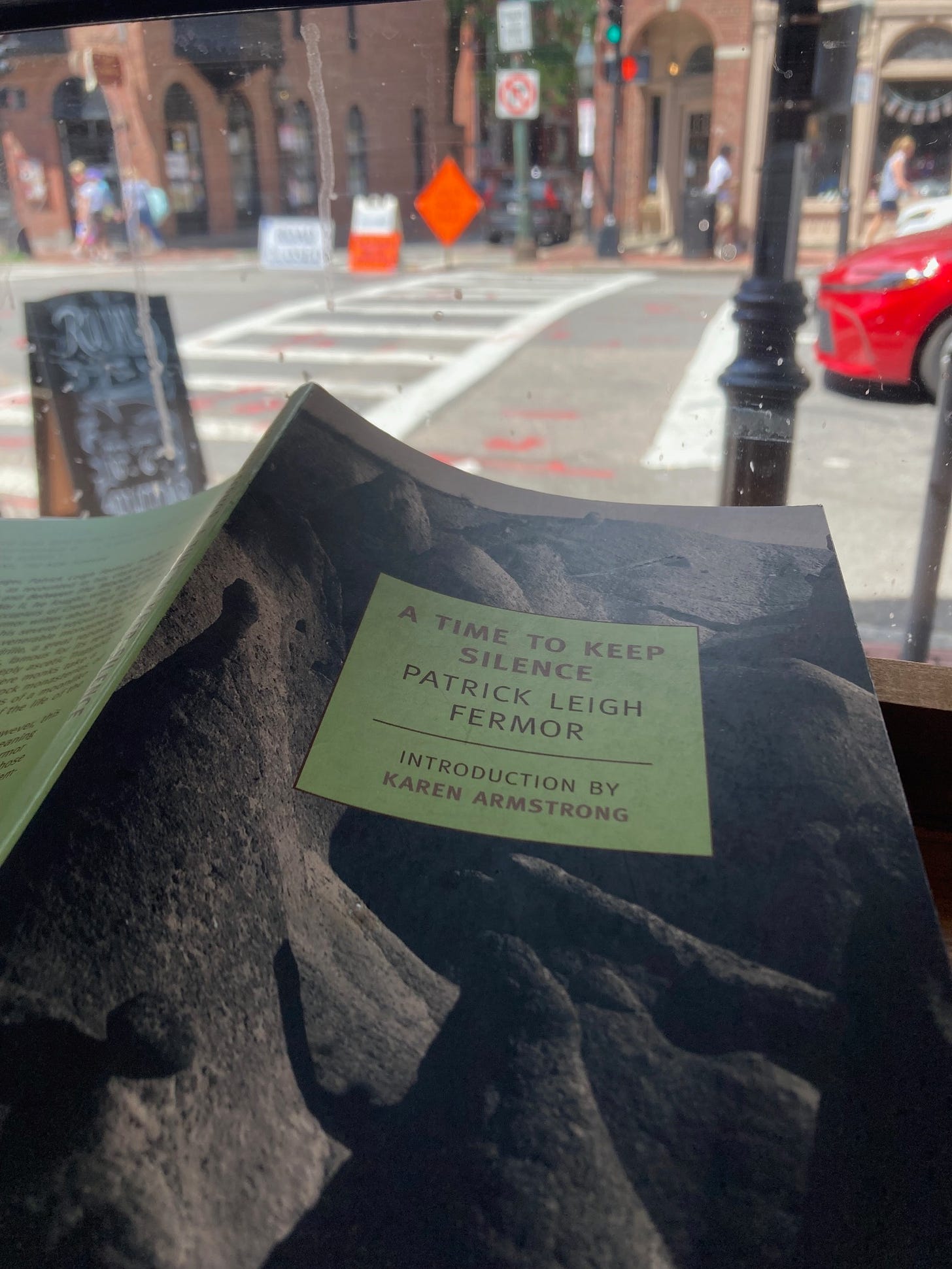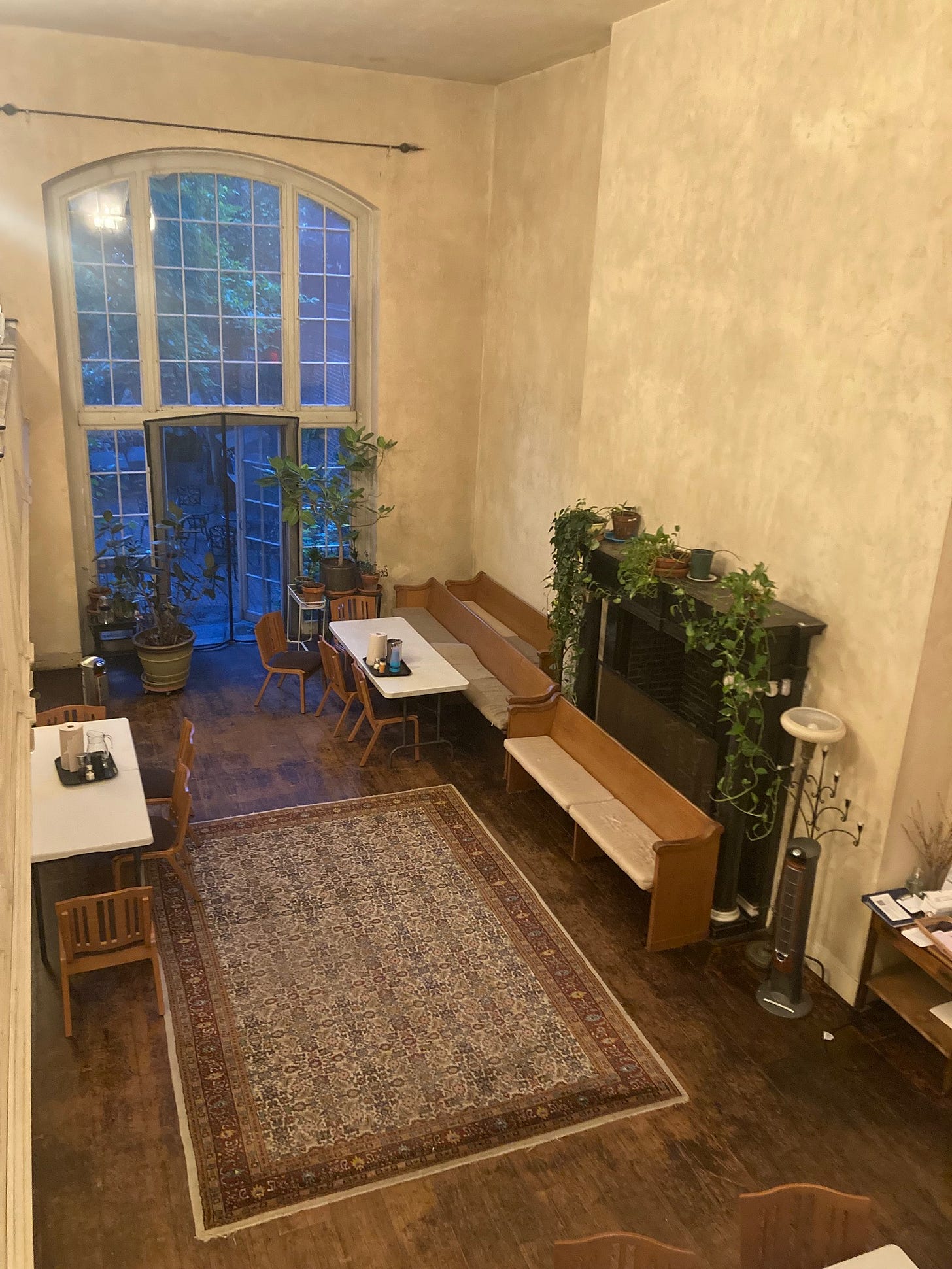I’ve begun traveling for the summer. First off, a preposterous train trip up to Maine to drop my children off at summer camp.
And about two hours all told at the beach. No water communion, but contemplation. I stayed at a small 50s boarding house by the water in an awkward but sufficient town; as night fell, various shapes seemed to sort of break off in encrusted form from my mind.
I’ve been thinking more about what to do in the land after tenure, and it occurs to me that my loyalty goes past words to what I think of as silence; when I was much younger I thought of it as the silence. Hard to come by in the literal sense at least where I live (I literally wear earplugs every night). But also something that’s pretty obviously everywhere, once you catch the sound. I remember being in Italy at age twenty and being drawn into the silence that could be heard underneath some very particular plants in one of the larger parks; it can also be heard in rooms no one has been in for a while, or observed as a small quiet item as the train flashes by it.
But it’s also hard to come by, sometimes easy to forget, and a kind of trick to maintain. And here’s where Patrick Leigh Fermor’s book comes in.
After Maine, I went to Boston, ostensibly to do some research, but also with plenty of romantic traveling notions, or rather, notions specific to me. I’d hoped to stay at the Anglican monastery there, but didn’t plan ahead far enough, and so made do/was most pleased to stay with the Quakers. They have a communal house in Beacon Hill one may visit. And when I showed up to a perfectly still and seemingly empty house, their meeting room was quieter still. My romantic notions now had their free reign, if in a different key.
A long time ago, I stayed with some Anglican nuns in Catonsville, Maryland, at a house that not too long afterward switched over to Rome, on account among other things, the installation of gay bishops; the house’s defection always feeling like a particular betrayal. The time I spent there was extraordinary, even to the point of starting to regret at the edges of consciousness that I was already at the time married (well, perhaps that was for other reasons as well).
So absent a monastery on this trip, I decided to finish the Fermor instead, which I’d put down in March, as a kind of substitute. I’d read his The Violins of St. Jacques earlier last fall at just the right moment (it is a book to read for when the dissolution of solid things is overwhelming), and loved it very much. A Time to Keep Silence is also perfect.
I’m purposely not learning too much initially about Fermor, so I can hear what he’s saying before psychologizing, but from his writing he seems to be what Beauvoir would regard as a perfect adventurer, someone aware of the absurdities and lack of natural fixity in human customs, but also with a deep respect for the real projects of others. And so, as someone curious about monastic life, without sharing its premises but taking seriously what its practitioners believe themselves to be doing, he managed to write a brief and finely tuned account of his time in France and elsewhere. The contrasts he draws between the quiet of the French Benedictines, the Greek Orthodox monks he fought alongside, and a final touch of the mysteriousness of abandoned rock-churches in Cappadocia, are a summer’s worth in themselves.
But most of all, he finds his mind coming to terms with silence. As he puts it:
“After initial spells of insomnia, nightmare and falling asleep by day, I found that my capacity for sleep was becoming more and more remarkable: till the hours I spent in or on my bed vastly outnumbered the hours I spent awake; and my sleep was so profound that I might have been under the influence of a hynoptic drug. For two days, meals and the offices in the church—Mass, Vespers and Compline—were almost my only lucid moments. Then began an extraordinary transformation: this extreme lassitude dwindled to nothing; night shrank to five hours of light, dreamless and perfect sleep, followed by awakenings full of energy and limid freshness. . . . This new dispensation left nineteen hours a day of absolute and godlike freedom.”
The books ends with a surprise to the reader: he has found a mean between the unbelieving Anglican clergy of his day and the self-flagellation of the French Trappists, and writes to you from another monastery, a Benedictine one, in England. His earlier skepticism has found a center-platz in the people he has met and come to respect; and most of all, in places where he’s found the habit of visiting if not staying forever.
And so, a small greeting from a quiet hall, and a not so quiet denomination (my room is named the Mary Dyer room). Every church smells different, and the quality of silence in each has its own noise. But this was a particularly lovely quiet freedom, the better to think but also to be before the necessity of thought.
Onward to following summer in still stranger climes!







A Time To Keep Silence is a wonderful read, thank you for reminding me of it.